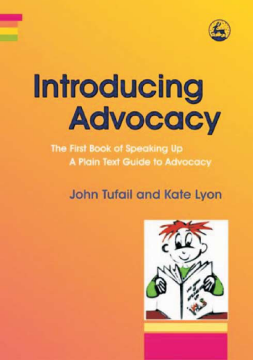
Additional Information
Book Details
Abstract
The book is clearly written and is consistent in style and presentation. Advocacy draws attention to the need for the individual's views to be expressed, communicated and understood by those around them and that advocacy is not what other people think the individual wants. Tufail and Lyons clearly and consistently reinforce this message throughout the book and illustrate this through the use of well-devised case studies to which most people can relate.'
- The Frontline of Learning Disability
'The Four Books in this series; 'Introducing Advocacy', 'Rules and Standards', 'Listen Up!' and 'Advocacy in Action' are comprehensive, informative and quite simply a very good introduction for someone new to the world of advocacy.'
- Practice Links in Social Work
Advocacy for people with disabilities is widely practised, but what about self-advocacy? How often do parents or carers speak `for' you and prevent you being heard? Do you know your rights within advocacy law? The four books in the Speaking Up set were conceived and written specifically to promote self-advocacy to disabled individuals who want to learn how to speak up for themselves.
This first book in the series introduces the concept of advocacy and explores appropriate advocacy models, for example peer group supportive models, and examines different forms of advocacy such as campaign advocacy, crisis or intervention advocacy, volunteer advocacy and health complaints advocacy.
All four books are illustrated throughout with colour drawings and case studies showing the positive results of self-advocacy on the individuals themselves, as well as on their families and carers.
This empowering training package encourages an equal partnership between the advocate and the user where the shared goal is to develop the life skills of the individual with learning difficulties. It is accessible to people with a wide range of literacy needs, including those with high learning needs and is designed for use in formal and informal learning situations, either unsupported or with a facilitator present.
Gaining any degree of independence is difficult for people with disabilites, but not necessarily because disabilites prevent them. Often the people around them do not have the skills, time, sensitivity or intelligence to understand that the person with disabilities thinks, has feelings and preferences, and may have goals for themselves quite seperate from those assigned to them by others. This first title in a four-book training set is written for people with disabilities who want to develop advocacy skills for themselves and their peers or partners. With a minimum of jargon, this gives readers basic theories and practices of different types of advocacy, including campaign and citizen advocacy, crisis or intervention advocacy, volunteer and non-directed advocacy as well as tips on planning circles, health complaints advocacy and self-advocacy.
BookNews.com
John Tufail and Kate Lyon are directors of People's Advocacy Network in Wellington, New Zealand. John Tufail has over 30 years' experience working in the disability sector, specialising in high communication needs. Since the 1980s, he has been increasingly involved in developing advocacy services. John has been lead investigator on a number of research projects into advocacy provision, both in the UK and internationally, and was central to the development of the UK's first university advocacy course at the University of East London. Kate Lyon is a self-employed graphic designer and web-page designer and the winner of four industry awards. She runs her own learning and design company, Merlin Design.
